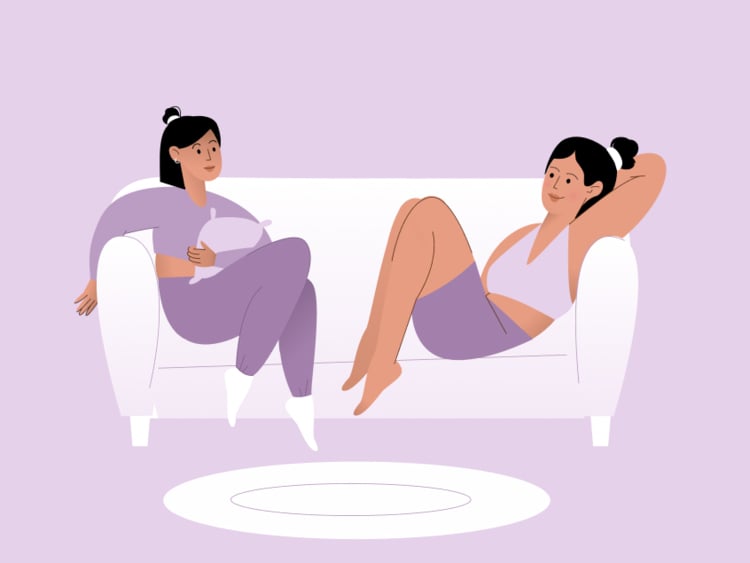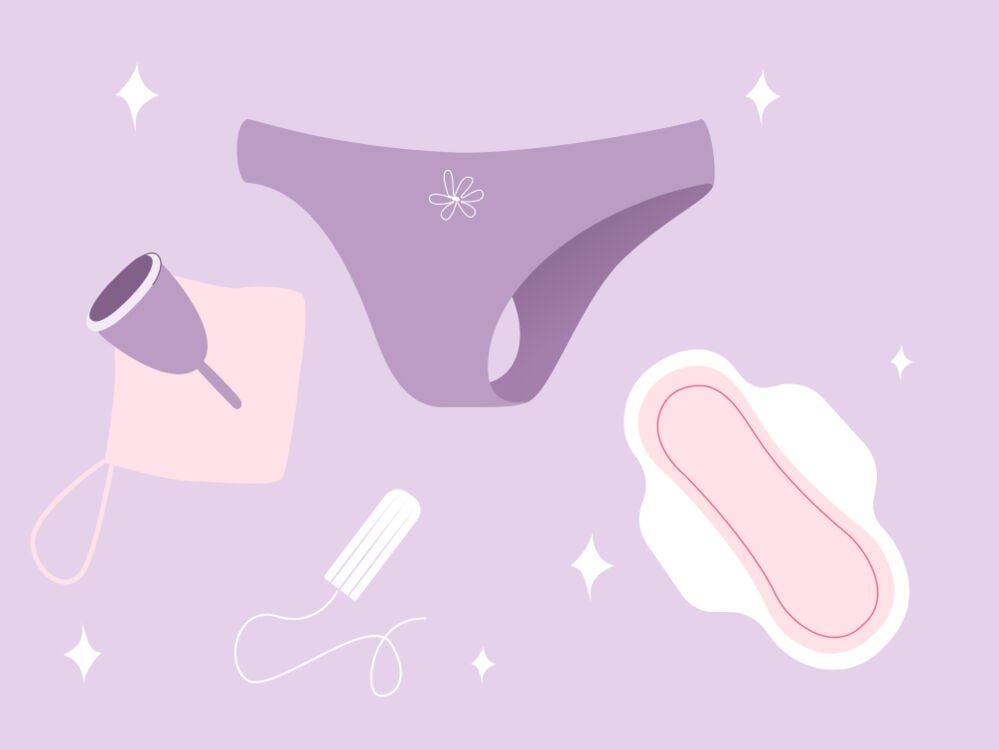You might feel overwhelmed by the idea of talking to your daughter about their first period, but you’re not alone. Here, two Flo experts explain some of the signs that your child is about to start their period and how you can help them navigate it.
-
Tracking cycle
-
Getting pregnant
-
Pregnancy
-
Help Center
-
Flo for Partners
-
Anonymous Mode
-
Flo app reviews
-
Flo Premium New
-
Secret Chats New
-
Symptom Checker New
-
Your cycle
-
Health 360°
-
Getting pregnant
-
Pregnancy
-
Being a mom
-
LGBTQ+
-
Quizzes
-
Ovulation calculator
-
hCG calculator
-
Pregnancy test calculator
-
Menstrual cycle calculator
-
Period calculator
-
Implantation calculator
-
Pregnancy weeks to months calculator
-
Pregnancy due date calculator
-
IVF and FET due date calculator
-
Due date calculator by ultrasound
-
Medical Affairs
-
Science & Research
-
Pass It On Project New
-
Privacy Portal
-
Press Center
-
Flo Accuracy
-
Careers
-
Contact Us
Signs your daughter is about to start her period: How to spot them without being intrusive


Every piece of content at Flo Health adheres to the highest editorial standards for language, style, and medical accuracy. To learn what we do to deliver the best health and lifestyle insights to you, check out our content review principles.
Most of us remember the moment we got our first period. Likely, upon spying blood in your underwear for the first time, you turned to your parents or guardians for help and advice. It can be a pretty jarring development, after all.
If your child is approaching their teens, they might be showing signs that they’re about to start their first period (also known by the medical term menarche) without you even realizing it. And it’s totally normal to feel nervous that you’re the one they’re going to turn to for the answers.
Firstly, let’s be real: You absolutely don’t need to be an oracle of all things periods. You don’t need to be a total expert in premenstrual syndrome (PMS), either. You can use an app like Flo to learn together. And because it’s always nice to feel in the know, we spoke with pediatrician Dr. Iyabo Webzell and obstetrician and gynecologist Dr. Sara Twogood about the signs you can look for that your daughter might be about to start her first period.
While the term “daughter” is used throughout this piece, as it describes a common experience, this guide will help you navigate your child’s first period, whatever their gender identity.
What is the average age to start your period?
If you aren’t sure if your child has started going through puberty yet, don’t put too much pressure on yourself. They probably won’t want to answer questions about acne and discharge over their morning bowl of cereal.
However, knowing the average age that they might start their period could give you an idea of when to start speaking to them about their cycle. “The average age is about 12 or 13,” explains Dr. Twogood. Periods start when the body is ready, so remember that this can be at different times for different people. However, if your daughter hasn’t started her period by the time she’s 15, you should reach out to your health care provider for support. They may offer a blood test to monitor hormone levels.
A number of factors can impact when a first period comes, including:
- Stress levels
- Hormone imbalances
- Intensity of exercise — If your child is exercising to the point where they’re using up the energy that’s normally reserved for maintaining their body’s natural processes (such as their period), then it may result in their period stopping or a delay in starting.
- Genetics might not seem like the most obvious indicator of when your child will start their period, but studies have highlighted that genes may play a role in when people start experiencing puberty.
Take a quiz
Find out what you can do with our Health Assistant
Key signs that your daughter is about to start her period
Opening up a conversation with your child about puberty and periods before they actually start their period could help them prepare for the changes that are to come. But rest assured; this doesn’t need to turn into ‘The Talk’ (you know the one ...)
Instead, ask them what they already know or have experienced. Use articles and apps (such as Flo) to educate both of you and don’t be afraid to find things out together.
“A first period is usually expected about two (to three) years after breast buds start forming,” explains Dr. Twogood. “That is a good marker for parents because breast buds are usually fairly noticeable. Vaginal discharge is also usually noticed about 6 to 12 months before a period starts.” Around this time, your child might also experience a growth spurt.
According to Dr. Webzell, the key signs that your daughter is about to start her first period may include:
- Spotting of blood
- Bloating
- Mood changes
- Abdominal and back cramping
- Tender and fuller (engorged) breasts
- Nausea
- Acne breakouts
What does a first period look like?
In terms of what to expect when your daughter gets her first period, Dr. Webzell explains: “The first period may present as darker blood, is often light in flow, and presents as ‘spotting.’” Spotting describes light bleeding outside of a normal period.
A first period may initially look like brown or pink discharge that turns into more distinctive red blood, but this often isn’t indicative of how it will be once it settles down. “A first period can differ from one person to another. There is no ‘right’ first period,” says Dr. Twogood. “However, it’s typically not super heavy. It’s also normal to have irregular periods during the first few years. So someone may have their first period and then not have another period for several months.” If you or your child is worried about their cycle, there’s more information below about when to reach out to your health care provider.
How long does your first period last?
While the average period lasts three to eight days, first periods don’t always follow that pattern. “They may last anywhere from a few hours to one day, to even five to seven days,” says Dr. Webzell. “The first several periods are irregular and unpredictable, so it is best to be prepared in case it starts at any time.”
In some cases, it can take a teenage body a couple of months to get into a regular menstrual cycle, so the first period may be much shorter than expected. A 45-day menstrual cycle might seem incredibly long, but during the first year when you start your period, anything between 21 and 45 days can be considered normal. But after three years of having periods, when things have settled down a little bit, between 60% to 80% of menstrual cycles range from 21 to 34 days long. This is totally typical.

As the first few periods can be pretty irregular, it can be difficult to know when to speak to your health care provider if you think something may be wrong with your daughter’s menstrual cycle. However, you should speak to your medical professional in any of these cases:
- Their period is particularly heavy.
- Their period goes on for longer than eight days.
- They start their period and then don’t have another for three months.
- They’re experiencing severe abdominal and back cramps.
- They’re having severe headaches.
How to talk to your daughter about starting their period
The unknown can be really scary. By speaking to your child about their period, PMS, and period products before their cycle starts, you can tackle any stigma they may have picked up and answer any questions.
“Parents and caregivers should talk about periods — expectations, what to do, what to expect. Emphasize that this is normal and that every [woman] goes through it,” says Dr. Twogood. “Encourage them to ask questions and provide solid information. If you don't know the answer to a question, say so.”
Body and period stigmas still exist in the world today, and your teen may have picked up some of this. But by speaking openly about the changes they’ll go through, you can make it a positive thing. Dr. Twogood says it’s important to “normalize periods. Avoid derogatory terms and slang that make it seem dirty or something to be ashamed of.”
And you don’t have to go into this conversation alone. Use educational tools (such as Flo) to help your child understand.
It’s also worth considering the practicalities. Your daughter might not be with you when they start their period, so would they like to start carrying period products, just in case? By being so open about periods, you’ll hopefully convey the message that periods aren’t something to be ashamed of. If they need to ask another person, like a teacher or a friend, for help when you’re not there, then that’s totally fine.
Signs your daughter is about to start her first period: The takeaway
The average age that periods start is between 12 and 13. However, your teen will begin showing signs, like developing breast buds and producing vaginal discharge, a couple of years before.
As the first few periods can be irregular, you might want to help your child start tracking their cycle using an app such as Flo. This may help them feel some control over the change and could help you to anticipate how they’ll be feeling at any given time. When their cycle stabilizes in a few years, they’ll know exactly what to expect and when to expect it.
Lastly, if you’re feeling nervous about your child starting their period, don’t worry. You’re absolutely not alone. The most important thing is that your child knows you’re there as gentle support. Getting your first period can be overwhelming, but feeling reassured that you’re by their side, your daughter should be able to handle this new stage of her life far more easily.


Hey, I'm Anique
I started using Flo app to track my period and ovulation because we wanted to have a baby.


The Flo app helped me learn about my body and spot ovulation signs during our conception journey.


I vividly
remember the day
that we switched
Flo into
Pregnancy Mode — it was
such a special
moment.
Real stories, real results
Learn how the Flo app became an amazing cheerleader for us on our conception journey.
References
“Abnormal Menstruation (Periods).” Cleveland Clinic, www.my.clevelandclinic.org/health/diseases/14633-abnormal-menstruation-periods. Accessed 13 Sep. 2022.
“Amenorrhea: Absence of Periods.” The American College of Obstetricians and Gynecologists, www.acog.org/womens-health/faqs/amenorrhea-absence-of-periods. Accessed 13 Sep. 2022.
Cho, Geum Joon, et al. “Effects of Intensive Training on Menstrual Function and Certain Serum Hormones and Peptides Related to the Female Reproductive System.” Medicine, vol. 96, no. 21, May 2017.
“Hormonal Imbalance.” Cleveland Clinic, www.my.clevelandclinic.org/health/diseases/22673-hormonal-imbalance. Accessed 13 Sep. 2022.
“Irregular Periods.” NHS, www.nhs.uk/conditions/irregular-periods/. Accessed 13 Sep. 2022.
Jahanfar, Shayesteh, et al. “Genetic and Environmental Effects on Age at Menarche, and Its Relationship with Reproductive Health in Twins.” Indian Journal of Human Genetics, vol. 19, no. 2, Apr. 2013, pp. 245–50.
Lacroix, Amy E., et al. “Physiology, Menarche.” StatPearls, StatPearls Publishing, 2022.
Carroll, Robert G. “Menarche.” Elsevier’s Integrated Physiology, Elsevier, 2007.
“Menorrhagia (Heavy Menstrual Bleeding).” Mayo Clinic, 25 June 2022, www.mayoclinic.org/diseases-conditions/menorrhagia/symptoms-causes/syc-20352829.
“Menstruation in Girls and Adolescents: Using the Menstrual Cycle as a Vital Sign.” The American College of Obstetricians and Gynecologists, www.acog.org/clinical/clinical-guidance/committee-opinion/articles/2015/12/menstruation-in-girls-and-adolescents-using-the-menstrual-cycle-as-a-vital-sign. Accessed 13 Sep. 2022.
“Normal Menstruation.” Cleveland Clinic, www.my.clevelandclinic.org/health/articles/10132-normal-menstruation. Accessed 13 Sep. 2022.
Thiyagarajan, Dhanalakshmi K., et al. “Physiology, Menstrual Cycle.” StatPearls, StatPearls Publishing, 2021.
“Period Problems.” NHS, 10 Mar. 2022, www.nhs.uk/conditions/periods/period-problems/.
“Starting Your Periods.” NHS, 16 Mar. 2022, www.nhs.uk/conditions/periods/starting-periods/.
“Your First Period.” University of Colorado OB-GYN, 10 Feb. 2014, www.obgyn.coloradowomenshealth.com/health-info/teens/first-period.
“Your First Period.” The American College of Obstetricians and Gynecologists, www.acog.org/womens-health/faqs/your-first-period. Accessed 13 Sep. 2022.




